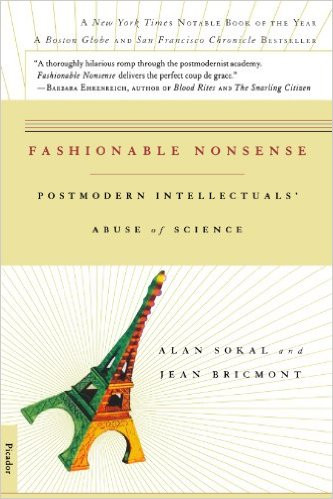Рецензия на книгу Alan Sokal and Jean Bricmont (1997) Fashionable Nonsense ("Интеллектуальные уловки")

Слово «постмодернизм» сейчас слышно реже и реже. По крайней мере в отличие от 10 лет назад, когда я учился на филфаке оно звучало отовсюду. Но эту книгу, которая сделала целью разоблачить теперь малоактуальный и надоевший «постмодернизм», по-прежнему активно упоминают в разных окологуманитарных кругах. Можно сказать, что она оказалась «больше своей судьбы», став символом и лакмусовой бумажкой в непрекращаяющихся (по крайней мере в России) спорах между позитивистами и антипозитивистами и в дискуссиях о легитимности разного рода гуманитарного знания (или — точнее — гуманитарных дискурсов). Как человек, мятущийся между скукой позитивизма и страхом (и трепетом) перед всем интересным, лежащим за его пределами, я должен был когда-то прочитать эту книгу. Книга произвела ожидаемый эффект, раздвоив мое сознание на две половины. Одну половину обрадовала теоретическая основа книги, связанная с рациональными аргументами против «релятивизма» и «социального конструирования» научного знания (лежащего, по мнению авторов, в основе «постмодернизма»). Другую половину оттолкнуло некоторое «дурновкусие» мелочных «бухгалтерских» (как говорит Паша Арсеньев) придирок к чужим интересным текстам (если бы они были неинтересными, их бы уже давно никто не обсуждал). Учитывая, что эти две вещи почти строго соответствовали разным разделам книги, у меня возникло общее неудовольствие
Книга состоит из трех основных блоков: 1) фрагменты поструктуралистских текстов (разбитые по авторам), в которых фигурируют математические и физические понятия, употребленные с ошибками; 2) статья-пародия Сокала на постмодернисткий/постструктуралистский дискурс, которую опубликовал в 1996 году (до сих пор существующий) журнал Social Text,
Сама пародия не представляет особого интереса кроме того, что Сокал пишет, что ему очень трудно давалась бессмыслица. Действительно, генераторы с этим справляются лучше. Поэтому «фейковость» статьи состоит, скорее, в заведомо ложных (с точки зрения Сокала), но вполне осмысленных суждениях (помимо всяких неточностей по мелочам).
Ср. этот фрагмент, где по сути излагается пресловутый «релятивизм», с которым Сокал полемизирует.
It has thus become increasingly apparent that physical “reality”, no less than social “reality”, is at bottom a social and linguistic construct; that scientific “knowledge”, far from being objective, reflects and encodes the dominant ideologies and power relations of the culture that produced it; that the truth claims of science are inherently theory-laden and self-referential; and consequently, that the discourse of the scientific community, for all its undeniable value, cannot assert a privileged epistemological status with respect to counter-hegemonic narratives emanating from dissident or marginalized communities.
Теперь к самому интересному в содержательной части.
Главное здесь — это общее возражение против релятивизма, идеи, что научное знание — это социальный конструкт, не зависящий от эмпирической реальности. Это возражение приводится против Куна (его радикального прочтения, так называемая проблема «двух Кунов» в философии науки).
By contrast, the immoderate Kuhn—who became, perhaps involuntarily, one of the founding fathers of contemporary relativism—thinks that changes of paradigm are due principally to non-empirical factors and that, once accepted, they condition our perception of the world to such an extent that they can only be confirmed by our subsequent experiences. Thus, while it is true that scientific experiments do not provide their own interpretation, it is also true that the theory does not determine the perception of the results.<…> The second objection against the radical version of Kuhn’s history of science—an objection we shall also use later against the “strong programme” in the sociology of science—is that of self-refutation. Research in history, and in particular in the history of science, employs methods that are not radically different from those used in the natural sciences: studying documents, drawing the most rational inferences, making inductions based on the available data, and so forth. If arguments of this type in physics or biology did not allow us to arrive at reasonably reliable conclusions, what reason would there be to trust them in history? Why speak in a realist mode about historical categories, such as paradigms, if it is an illusion to speak in a realist mode about scientific concepts (which are in fact much more precisely defined) such as electrons or DNA?
Сокал говорит, что аргумент против рациональности научного знания («научное знание есть продукт социальных факторов») сам опирается на эту рациональность (хотя и факты там другие), которую он хочет опровергнуть. По Сокалу, нет никакой отдельной рациональности естественных и гуманитарных наук («свежесть бывает только одна»). Таким же образом Сокал защищает рациональность криминального расследования и здравого смысла в целом.
Все тот же аргумент Сокал приводит против «сильной программы» в социологии науки (Дэвид Блур) и Латура с его книгой «Наука в действии» (о которой я писал выше). Сокал их особо не разделяет, хотя у Латура есть полемическая статья против Блура.
Интересность полемики с Латуром в том, что Латур, как и Кун, также допускает сильное и слабое прочтение — одно банальное, а другое незащищенное от приведенного выше аргумента.
Since the settlement of a controversy is the cause of Nature’s representation, not the consequence, we can never use the outcome—Nature—to explain how and why a controversy has been settled. (Latour 1987, pp. 99, 258) Note how Latour slips, without comment or argument, from “Nature’s representation” in the first half of this sentence to “Nature” tout court in the second half. If we were to read “Nature’s representation” in both halves, then we’d have the truism that scientists’ representations of Nature (that is, their theories) are arrived at by a social process, and that the course and outcome of that social process can’t be explained simply by its outcome. If, on the other hand, we take “Nature” seriously in the second half, linked as it is to the word “outcome”, then we would have the claim that the “external world is created by scientists’ negotiations: a claim that is, to say the least, a rather bizarre form of radical idealism. Finally, if we take “Nature” seriously in the second half but expunge the word “outcome” preceding it, then we would have either (a) the weak (and trivially true) claim that the course and outcome of a scientific controversy cannot be explained solely by the nature of the external world (obviously some social factors play a role, if only in determining which experiments are technologically feasible at a given time, not to mention other, more subtle social influences); or (b) the strong (and manifestly false) claim that the nature of the external world plays no role in constraining the course and outcome of a scientific controversy.”
Но, если у Куна эта неопределенность, скорее всего, возникла ненамеренно, в отношении Латура Сокал намекает на стратегическую двусмысленность. Забавно, что сам Латур в «Науки в действии» пишет о том, что ученые используют в качестве «союзника» в своей риторике эту двусмысленность. Про себя Латур точно мог знать.
Ambiguity as subterfuge. We have seen in this book numerous ambiguous texts that can be interpreted in two different ways: as an assertion that is true but relatively banal, or as one that is radical but manifestly false. And we cannot help thinking that, in many cases, these ambiguities are deliberate. Indeed, they offer a great advantage in intellectual battles: the radical interpretation can serve to attract relatively inexperienced listeners or readers; and if the absurdity of this version is exposed, the author can always defend himself by claiming to have been misunderstood, and retreat to the innocuous interpretation.
Защитив рациональность от придирок содержательного аспекта «поструктурализма», Сокал нападает на его формальный, стилистический аспект. Он не понимает, зачем писать «сложно» с (неправильным) использованием математических метафор, когда можно писать ясно и без всяких метафор, которые только затемняют смысл. Иначе говоря, почему нельзя писать, как Докинз и Пинкер (на «Язык как инстинкт» которого Сокал ссылается как на образец научпопа)? Ричард Фейнман использовал в качестве теста на бессмыслицу возможность пересказать простым языком, значит даже самое сложное можно объяснить так, чтобы понял пятилетний ребенок.
Частичный ответ, на который намекает Сокал, в престиже точных наук начиная с середины XX века, в желании интеллектуалов легитимировать гуманитарные науки, т.е. доказать, что это тоже науки. Отсюда стремление звучать «наукообразно», имитируя точные науки на уровне стиля. Сокал возражает, что социогуманитарные науки не нуждаются в такой легитимации, что они вполне себе легитимны, пока опираются на рациональность. Более того, не следует бояться, что социогуманитарные науки сведутся к точным (и у гуманитариев не останется работы), т.к. до этого химики напрасно боялись, что их сведут к физике и т.д.
Don’t ape the natural sciences. The social sciences have their own problems and their own methods; they are not obliged to follow each “paradigm shift” (be it real or imaginary) in physics or biology. <…> Besides, even if one adopts a reductionist philosophical attitude, one is by no means obliged to pursue reductionism as a methodological prescription. In practice, there are so many orders of magnitude separating atoms from fluids, brains, or societies that vastly different models and methods are quite naturally employed in each realm, and “establishing a link between these levels of analysis is not necessarily the most urgent task. In other words, the type of approach in each domain of research should depend upon the specific phenomena under investigation. Psychologists, for example, do not need to invoke quantum mechanics to maintain that in their field “the observer affects the observed”; this is a truism, irrespective of the behavior of electrons or atoms. Moreover, there are so many phenomena, even in physics, that are imperfectly understood, at least for the time being, that there is no reason to try to imitate the natural sciences when dealing with complex human problems. It is perfectly legitimate to turn to intuition or literature in order to obtain some kind of nonscientific understanding of those aspects of human experience that cannot, at least at present, be tackled more rigorously.

Сокал не просто отвергает аргументы в пользу «темного», птичьего стиля, но и приводит леваческие аргументы (а он политический левый) за «ясный» стиль. Здесь он в целом опирается на идеи Фуко (в моем импрессионистическом понимании).
First of all, the extreme focus on language and the elitism linked to the use of a pretentious jargon contribute to enclosing intellectuals in sterile debates and to isolating them from social movements taking place outside their ivory tower. <…> If intellectuals, particularly those on the left, wish to make a positive contribution to the evolution of society, they can do so above all by clarifying the prevailing ideas and by demystifying the dominant discourses, not by adding their own mystifications.
Хотя с аргументами Сокала против релятивизма и за ясный стиль сложно не согласиться, — местами они похоже на трюизм, — он недооценивает роль удовольствия (от текста). Сокал коротко рассматривает это возражение и отвергает его:
Poetic licence. If a poet uses words like “black hole” or “degree of freedom” out of context and without really understanding their scientific meaning, it doesn’t bother us. <…> By contrast, we insist that the examples cited in this book have nothing to do with poetic licence. Their intention is clearly to produce theory, and it is on this ground that we criticize them. Moreover, their style is usually heavy and pompous, so it is highly unlikely that their goal is principally literary or poetic.
Да, маловероятно, что это главное, но это необходимо. Чтобы эти тексты читали, пересказывали, цитировали. Наконец, чтобы Сокал захотел их пародировать, написать про это книгу, а я — на нее рецензию.
Короче, Сокал недооценивает фактор моды и запроса на такой стиль, о котором пишет Ламонт в связи с Деррида. Но откуда возникает такой запрос — это уже отдельная тема. Возможно, ответ даст эта статья.
